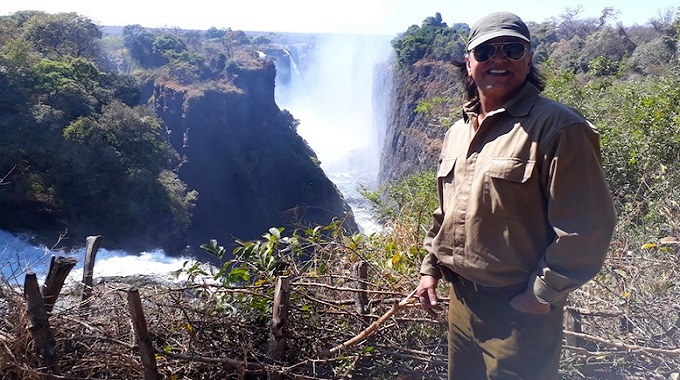
The Sunday Mail

Tourism
Charles Mavhunga
WEBSITE traffic in tourism branding refers to the number of visitors to a tourism brand’s internet site. It is a measure of the popularity and visibility of the brand online. The more website traffic a tourism brand receives, the higher its online presence and potential to attract customers.
Monitoring web site traffic allows tourism brands to analyse user behaviour, identify trends, and make informed decisions on optimising their online marketing strategies and improve their overall branding efforts.
In the context of Zimbabwe, the effect of sanctions on website traffic in tourism branding can be significant. Sanctions have the potential to create a negative image of the country’s tourism brand yet Zimbabwe is a peaceful, beautiful and lovable country.
The country has a diverse range of attractions, including Victoria Falls (Shungu Nyamutitima; Mosi-oa-Tunya), national parks and historical sites such as the Great Zimbabwe.
These attractions continue to draw international tourists despite the economic embargo.
In recent years, the country has seen an increase in tourist arrivals, and the tourism brand is gaining a lot of strength. The current performance of Zimbabwe’s tourism industry is growing despite the sanctions. The tourism industry has shown some resilience. Government is making tremendous efforts to promote tourism and to attract foreign investment in the sector. It has implemented policies to improve infrastructure, streamline visa processes and enhance security for tourists.
Additionally, Zimbabwe has actively participated in international tourism fairs and events to showcase its offerings. However, the impact of sanctions should not be ignored, especially given that the world has digitalised marketing strategies to make tourism destinations attractive.
Sanctions have the potential to harm the image of the country’s tourism destinations. This may adversely affect the website traffic of tourism brands associated with that destination. Fewer people may be interested in visiting or learning about a destination that is subject to sanctions. However, with strategic planning and implementation of various techniques, it is possible to drive more visitors to the website.
The following are strategies that organisations in the tourism industry may deploy to boost website traffic in tourism branding:
- Search engine optimisation (SEO): Implementing SEO techniques can improve the website’s visibility on search engines. This includes optimising content with relevant keywords, improving site structure and ensuring fast loading times.
- Content marketing: Creating high-quality and engaging content related to the tourism brand can attract more visitors. This could include blog posts, articles, videos and infographics that highlight the unique aspects of the destination or provide useful travel tips.
Videos showing the tranquil atmosphere of Zimbabwe’s tourist destinations are very important. These allow tourists to make informed decisions.
- Social media marketing: There is need to utilise social media platforms to promote the tourism brand and drive traffic to the website. Regularly posting engaging content, running targeted advertising campaigns and interacting with users can generate interest and increase website visits. The global world is often misinformed about Zimbabwe’s political atmosphere because opposition politicians are trying to attract donor support using falsehoods to keep their political parties in shape and well-funded.
It is, therefore, important for organisations in the tourism sector to be vigorous in terms of social media activism to ensure the content is spot on and up to date to keep customers fully informed.
- Influencer collaborations: Partnering with travel influencers or bloggers who have a significant following can help reach a wider audience. Collaborate with them to create content that showcases the destination and directs their followers to the web page for more information.
- Email marketing: Building an email list of interested individuals and sending regular newsletters can keep them engaged with the tourism brand. Include updates on new attractions, events and offers, along with links to the website for further details.
- Online advertising: Invest in online advertising campaigns to increase visibility, thereby attract more visitors. This could include display ads, pay-per-click campaigns or sponsored content on relevant websites or travel platforms.
- Partnership with travel agencies, including online ones: Collaborating with travel agencies can help increase exposure. Ensure the tourism brand is listed on their platforms and provide them with relevant content and offers to attract potential visitors.
- User-generated content: Encourage visitors to share their experiences through reviews, testimonials and social media posts. This user-generated content can create a positive buzz around the tourism brand and attract more visitors to the website.
- Local SEO: Targeting local search queries can be beneficial, especially if the tourism brand relies heavily on domestic visitors. Optimise the website and content for relevant local keywords to improve visibility in local search results.
- Website analytics and optimisation: Regularly analyse website traffic data to identify areas for improvement. Optimise the website’s design, navigation and user experience based on visitor behaviour to increase engagement and encourage longer stays on the site.
Despite the sanctions, implementing these strategies can help improve website traffic and enhance the tourism brand’s online presence. It is essential to adapt to changing circumstances and continuously monitor and refine marketing efforts to maximise results.
Charles Mavhunga co-authored textbooks in business enterprising skills and is currently studying for a PhD in Management at Bindura University. He can be contacted at: [email protected]. Cell:0772989816.



